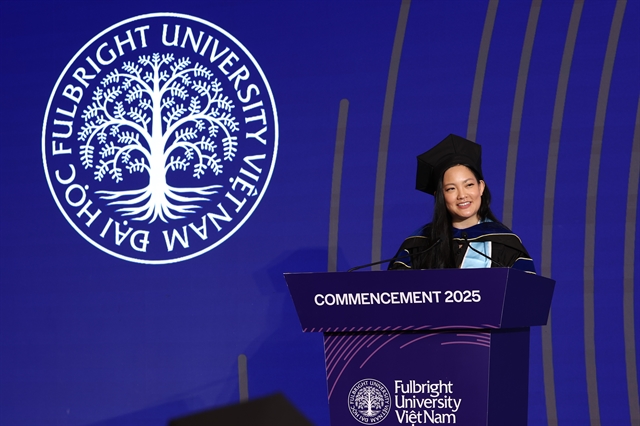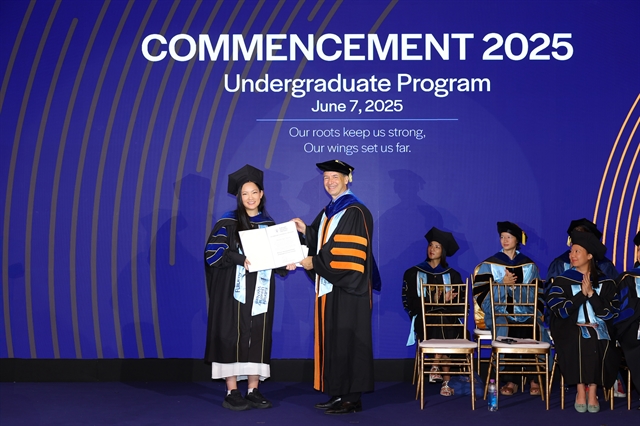.jfif) Opinion
Opinion

 |
| Amanda Nguyễn, an activist for women rights and the first Vietnamese American to fly into space. - Photo courtesy of Fulbright University Vietnam |
Renowned women’s rights activist Amanda Nguyễn, the first Vietnamese American and Southeast Asian woman to fly into space, was invited as an honored speaker at Fulbright University Việt Nam’s commencement ceremony for the Class of 2025, held on Saturday.
During her visit, Nguyễn spoke with Vietnamese media about her accomplishments and Vietnamese heritage, aiming to inspire younger generations in Việt Nam to pursue their dreams.
Could you share your thoughts and personal reflections on Việt Nam, particularly in light of your recent journey into space?
I have several astronaut flight suits, including one with the American flag. However, the suit I wore during my spaceflight did not bear any flag.
But when people look at me, and when I see myself in the mirror, I see a Vietnamese American.
For me, what has deeply nurtured my love for my heritage—aside from the amazing food!—is the sense of community. Our values teach us to support and uplift one another, and I wanted to ensure that others could have the same opportunities as I did.
My goal with my spaceflight was to shine a spotlight on the talent that exists in Việt Nam. While I may be the first Vietnamese woman to fly into space, my mission is to keep the door open for others to follow and have the opportunity to travel to space.
I was deliberate in seeking ways to collaborate with the Vietnam National Space Centre, and I’m incredibly grateful that I had the chance to carry lotus seeds on my journey. Additionally, one of my plant pathology experiments was conducted in partnership with the Vietnam National Space Centre and American plant pathologists at the University of Wisconsin-Madison.
The first letter I received after returning to Earth was from the State President of Việt Nam. I am incredibly grateful to him, as well as to the Vietnamese community both at home and around the world, for their unwavering support and enthusiasm throughout my spaceflight.
One particularly touching moment was seeing a photo of United States Ambassador to Việt Nam, Marc Knapper, sitting alongside Việt Nam’s first astronaut, watching my flight together. I am really grateful to have been a part of these moments of unity.
As a Vietnamese American, how have your Vietnamese roots motivated you in pursuing your career and achieving your dream of becoming an astronaut?
I believe—though I may be biased!—that Vietnamese people are among the most brilliant in the world, and that is why I was able to go to space.
I am also grateful for the history of resilience that we've had for centuries.
When I was thinking about my astronaut call sign, I wanted to choose something that was significant, something that would honour my heritage, which is why I chose Dragon.
All my life, people have often said that I am more like a phoenix. But really, I draw strength from our culture, which teaches us that no matter the obstacles, we can achieve whatever we set our minds to—and that, indeed, we can be dragons.
 |
| Amanda Nguyễn is honoured for her contributions to human rights and social justice. - Photo courtesy of Fulbright University Vietnam |
Before returning, what did you imagine Việt Nam—your native nation—would be like, and how has your perception evolved since?
This is the second time in my adult life that I have been to Việt Nam. I grew up knowing about Việt Nam through the lens of my parents.
I'm grateful that we live in a global age. Some of my family are still in Việt Nam, and so I was able to learn about Việt Nam through their photos and FaceTime.
But of course, it's always such a different experience to be in person.
I was quite nervous about how Việt Nam would receive the news. But I have only been met with open arms, and I am so grateful. I was so moved to see how warm and welcoming everyone here is.
I think that the biggest joy I've had is being able to be in community with people here, to see how accepting people are.
I've always known that Việt Nam was a great country, and I'm so glad that I get to witness that greatness in person.
How do you think the Vietnamese education system can expand access to STEM fields, international curricula, and aerospace opportunities? If you had the chance to collaborate with the Vietnamese Government, what would you like to do?
I think talent exists everywhere. And it really is about being able to tell the story of those who have that talent in order to make a difference in the world, and match them up to opportunities.
I think one of the biggest reflections that I had was the different experiments and missions that the Vietnam National Space Centre was focused on. I would love to continue to help grow the opportunities that people in STEM in Việt Nam have. I would love to work with the government on expanding what educational opportunities can look like, especially in the area of space.
I really look forward to learning more about what we can do together.
What message would you like to share with young Vietnamese, especially women and girls, about pursuing careers in STEM?
My biggest advice is to keep on keeping on.
If you are a student in STEM, especially as a woman in STEM, perhaps there are additional challenges that come with that. But know that your efforts are not in vain, if you can find your way through your programmes, through your career, a lot of doors can open up.
I once read a study that showed that women don't apply to jobs unless they think they're qualified or overqualified. And I want people to know that you should shoot your shot for opportunities.
There are systems that are in place that might give opportunities or make opportunities more readily available to different communities, but that doesn't mean that you don't belong in these spaces. So just go for it!
As an advocate for human rights, what key messages do you hope to convey?
My biggest message to anyone who cares about human rights is that you have so much power to be able to make a difference. The greatest thing that I want people to know, which is a value that I live by, is that no one is powerless when we come together and no one is invisible when we demand to be seen.
When I started out I felt really lonely. Who was I to meet Pope Francis or to be able to meet with these heads of states? But what I realised is that our stories are empathy machines and that they really do matter.
And if we're brave enough to share how we feel, then there will be people who will listen.
Our dreams still matter no matter how difficult they might seem. Just because no one from our community has done it before doesn't mean that it can't be done. VNS
Fulbright University Vietnam, the country’s first private, non-profit liberal arts university, was established in 2016 based on cooperation between Việt Nam and the US.
During the ceremony 180 bachelor's degree holders from various sectors were recognised, with many young Vietnamese who have made significant contributions to social thought, community projects and entrepreneurship initiatives.
During the ceremony 180 bachelor's degree holders from various sectors were recognised, with many young Vietnamese who have made significant contributions to social thought, community projects and entrepreneurship initiatives.Amanda Nguyễn gifted some of the lotus seeds that she brought with her space trip to new Fulbright graduates. She was also conferred the title of Honourary Distinguished Fellow by the university for her contributions to human rights, social justice and advocacy for marginalised communities. VNS